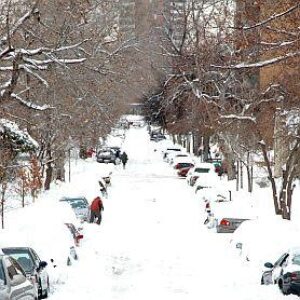
Joint Health Advisory
Agencies partner to issue cold weather health advisory; wind chill watch issued with potential for dangerously low temperatures
SPOKANE, Wash. - With a bitter wind chill watch in effect beginning tomorrow night, Dec. 22, and the potential for dangerously low temperatures, Spokane Regional Health District (SRHD) and its partners are issuing this health advisory. Exposure to cold temperatures can cause serious or life-threatening health problems. Infants and the elderly are particularly at risk, but anyone, including animals, can be affected.
"When the weather is extremely cold, and especially if there are high winds, try to stay indoors," said Lyndia Wilson, Disease Prevention and Response director for Spokane Regional Health District. “To avoid hypothermia and frostbite, make any trips outside as brief as possible, and remember that by preparing for winter emergencies, the risks of weather-related health problems can be reduced.”
The National Weather Service issued the wind chill watch, forecasting wind chill readings for 2 below into Saturday, Dec. 23.
Extreme cold presents a dangerous situation that can result in health emergencies in susceptible people, such as those without shelter or who are stranded, or who live in a home that is poorly insulated or without heat. City of Spokane reminds the community that there is now a 24/7 shelter system in Spokane that ensures youth, families and individuals experiencing homelessness have a safe, warm place to stay with their pets and possessions during extreme cold weather.
Preparing for extreme cold
- Stock up on emergency supplies for communication, food, safety, heating, and car. Check out these winter weather checklists from ready.gov
- Listen to the radio or television, or follow social media channels, for winter storm forecasts and other information.
- Have appropriate cold weather clothing available.
- Make sure fireplace functions properly.
- Fill your vehicle’s gas tank before temperatures start dropping.
During periods of extreme cold
When residents must use space heaters and fireplaces to stay warm, the risk of household fires increases, as well as the risk of carbon monoxide poisoning. Use fireplaces, wood stoves, or other combustion heaters only if they are properly vented to the outside and never use a charcoal or gas grill indoors—the fumes are deadly.
Here are other tips to keep residents safe during extreme cold temperatures:
- If an individual must go outdoors, wear several layers of loose fitting, light weight, warm clothing rather than one layer of heavy clothing. Wear mittens rather than gloves. Wear a hat. Cover mouth with a scarf to protect lungs from extremely cold air.
- Watch for signs of frostbite and hypothermia
- Signs of frostbite include a white or grayish-yellow skin area, skin that feels unusually firm or waxy, or numbness.
- Signs of hypothermia include slurred speech, disorientation, uncontrollable shivering, stumbling, drowsiness and body temperature of 95 degrees Fahrenheit or less.
- If a resident becomes trapped outside, get out of the wind and stay dry. Build a lean-to or snow cave if nothing else is available. Do not eat snow; it will make you too cold.
- Do not drive unnecessarily.
Individuals should also take appropriate steps to protect their pets/livestock and their property. Make sure pets/livestock have protected shelter and check their food/water frequently to make sure they have plenty and it is not frozen. The Spokane County Animal Protection Service (SCRAPS) may have gently used dog houses available, contact them at (509) 477-2532.
Residents should also avoid frozen pipes by knowing where their main water shutoff valves are, disconnecting outside hoses, insulating pipes, and sealing openings in basements around the foundation, windows and doors.
Remember also that winter weather patterns can trap air pollution – especially from wood stoves and fireplaces – near the ground, where it can build-up. This air pollution may threaten people’s health, especially those who have a lung condition like asthma, chronic obstructive pulmonary disorder (COPD), or with heart disease. Again, residents are encouraged to stay indoors.
For more local health-related emergency preparedness info visit the health district’s page. Become a fan of SRHD on Facebook to receive local safety and wellness tips or follow them at @spokanehealth. You can also visit Greater Spokane Emergency Management’s website for preparedness information. Or follow GSEM on Facebook and Twitter @gegemergencymgt
